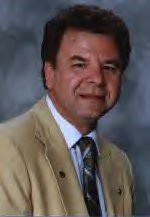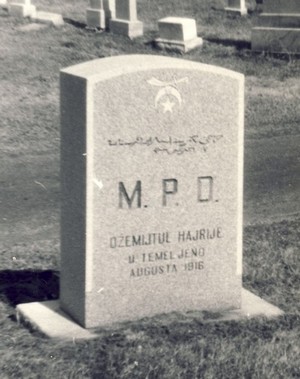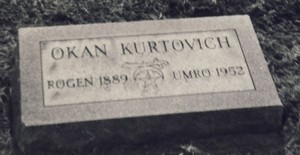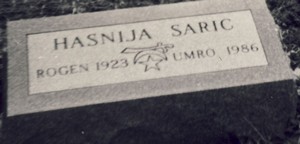
Sponsored Ads
|
| Eck Spahich distinguished Croatian-American died |
| By Prof.Dr. Darko Zubrinic |
Published
11/8/2008
|
Croatians in B&H , People
|
Unrated
|
|
|
|
President of Croatian Philatelic Society
 Eck Spahich, outstanding Croatian in the USA
Ekrem "Eck" Spahich, a distinguished Croatian-American from Texas, passed away after a courageous battle with cancer. Eck was born in 1945 in Tuzla, Bosnia. At the age of four months, at the end of WWII, his parents took him and retreated with the Croatian army toward Bleiburg, Austria. In the chaos, his parents were separated and never saw each other again. Having little choice, Eck's father left his infant son with a peasant woman in Slovenia. Eck's uncle took him back to Tuzla to his grandmother who raised him.
At the age of fifteen, Eck immigrated to the United States and was reunited with his father in Amarillo, Texas. After arriving in the United States, Eck completed high school and subsequently attended West Texas State University, graduating in journalism and history.
Eck volunteered in the Vietnam War and served as a war journalist and was awarded for his merits. After an honorable discharge from the U.S. Army, he settled in the city of Borger, Texas, and became an editor of the Borger News Herald.
In 1973, Eck married Helen, a medical nurse. They had two children and two grandchildren. In addition to journalism, Eck was successful in real estate and was awarded several times for his activity.
During the recent war in the former Yugoslavia, Eck was tireless in collecting and sending money, food, medicines, and clothes to the victims of the war. Most important was his journalistic activity resulting in countless letters and articles to all who could help defend Croatia and Bosnia and Herzegovina from Serbian aggression.
In 1972, Eck organized the Croatian Philatelitic Society and started the social journal, Trumpter (Trubljac). He was an active member of "Bluebonnet" Croatian Fraternal Union Lodge 1836 in Houston.
In 1993, Eck was especially pleased to receive an award by the Daughters of the American Revolution that represented their highest recognition given to naturalized Americans.
Also, Dr. Franjo Tudjman, the former president of Croatia, awarded Eck with "Red Hrvatskog Pletera" for his efforts in recognition of new nations and liberation from Serbian oppression. During the award presentation, Eck noted: "I am proud to be an American and Texan, but I am equally proud of my Croatian ancestry. This award is not only mine, it belongs to all who worked with me for freedom, independence and international recognition of Croatia."
Eck was asked by his dear friend how he wanted to be remembered. His answer was as a "Borac and Domobran"(fighter and Defender of the Homeland). That he was, and an inspiration to all who knew him.
Source: BULLETIN, Association for Croatian Studies, Fall 2008.
Many thanks to Nancy Crenshaw, Editor of the Bulletin
|
The first stamp of the Republic of Croatia in 1991.
|
Spahich Critical Of Troops To BosniaThe Canyon News (Texas), March 10, 1996:
Written by Earl Moseley
A Borger man who grew up in Bosnia was applauded by the Randall County Republican Women when he said he did not back President Clinton's move to send 20,000 troops as a peace-keeping force to his former homeland. Eck Spahich, a West Texas A&M Univeristy student in the late 1960s where he earned his bachelor's degree in journalism, spoke last Tuesday night for the GOP group at the Railroad Crossing Restaurant.
"I have promoted the idea of lifting the arms embargo of my country (Bosnia), but I have never supported sending troops to Bosnia," Spahich said. The naturalized American citizen who joined the U.S. Army for a tour ofduty in Vietnam, where he was awarded a Bronze Star for his actions, pointed out that Serbs had removed all weapons from the Bosnian Muslims and Catholics before begining their genocide campaign.
Th U.S. Congress had voted to lift the arms embargo, but Clinton would not comply, he said. It left the Muslims and Catholics defenseless. "Three-hundred thousand people have been killed. The same genocide happened in Germany during World War II. We said it would never happen again, but it has."
Spahich reported that possibly a half-million people have been wounded during the Serb's attempt at their "ethnic cleansing" movement, mostly children. He told his audience that 65 people from Bosnia now live in the Canyon-Amarillo area. Three members of the Barakovic family, who moved to Canyon about six months ago, were introduced at the meeting.
Others introduced were Sanela Besic, 24, who plans to enter Amarillo College to begin her studies as a nurse, and longtime Amarillo resident Dorothy Laurich, a registered nurse who recently visited her homeland of Slovenia. Spahich, now a Realtor, currently spends much of his free time helping his fellow Bosnians find places to live and work.
Bosnia was described by Spahich as always having had an ethnic mix- like the United States. However, only Serbs have seen that as a problem. "The Muslims, Catholics and other Christians, we lived together peacefully," he said. "What if Americans said they coudn't live with Baptists, Nethodists, Presbyterians, Mormons, Catholics? That's how it is in Bosnia."
Spahich, born in January 1945, was raised in Tuzla. His parents fled to Austria as a means of escaping the communist Iron Curtain. He remained there until he was 15. During the bitterest part of the 1995-96 winter, the bombed-out Tuzla became the base for the American peace-keeping force, under an agreement worked out by leaders of the the former Yugoslavia and Allied Forces in Dayton, Ohio.
"But the Dayton agreement," Spahich questioned, "was it just peace or just a piece?" Will there be peace when the American troops leave Bosnia? He doesn't know he said. However, he believes that all the rapes and murders committed by the Serbs would never have happened if the United Nations had taken action sooner than it did.
"I hope the United Nations never has to protect the United States," Spahich said. He pointed out that a referendum conducted in February 1992 throughout Bosnia indicated that 90 percent were for freedom from Communism, which meant bringing Yugoslavia to an end. "But the Serbs did not want to lose Communism. They created the Socialist Party of Yugoslavia."
"Back in the 1980s, President Reagan had the courage to say that Yugoslavia is an evil empire." Spahich recalled a time when a cousin called him from Croatia. "Eck, he said, 'they just started bombing Tuzla. You've got to get me out of here!'. But I coudn't. No matter what I did, I coudn't help him."
He confessed, "I wanted to bow down and kiss the floor of my house. I wanted to thank God that I was in America." He urged his audience that they should never be ashamed of America. "There are problems here, but they can be fixed. This is a great country, probably the best anywhere."
Spahich read the last paragraph of a column published two years ago in the Canyon News concerning his unusal life: "I wish desperately that I could dry his (Spahich's) tears for all time through peace in Tuzla, Bosnia, and Croatia. But how? I can only pray thatit happens. There is nothing too hard for the Lord Jesus Christ."
Spahich said: "I, too, have prayed about the situation. Regardless of the religions in Bosnia, these are my people. We have learned to tolerate religions. Religion to me has been very personal. Most Bosnians are Muslims. I promise you that their coming here will help America be a stronger country."
Source: www.CroatianStamps.com
|
Croatian-American Eck Spahich Awarded Croatian Presidental Medal The Zajednicar July 19, 2000 Letters Dear Mr. Cindrich: I would like to express my sincere gratitude to fellow Croatians in Houston, TX area for their part in recently hosting an awards ceremony in my behalf at the Ukrainian Catholic Church in north Houston. During the evening, I was honored with the Croatian "Pleter" medal conferred on behalf of the late President Franjo Tudjman. The Croatian Government's honor was presented to me by Croatia's Ambassador to Washington Dr. Miomir Zuzul, and Croatia's Consul Dr. Miso Munivrana of Los Angeles, CA, during an awards ceremony in conjunction with the Slavic Heritage Festival. My thanks goes to both Dr. Zuzul and Dr. Munivrana for being at the ceremony. I am also grateful to Dr. Martin Hrgovcic, founder and board member of the Croatian Fraternal Union Lodge 1836, in Houston, who introduced me and my wife Helen, to the Slavic crowd gathered that evening at the Ukrainian Church Social Hall. I am deeply honored with this award. This honor is not really mine alone, but belongs to all those who labored for so many years, for a free and independent Croatia: my wife, Helen, included. I shall never forget the spring 1992 picnic of the Lone Star Croatian Club on Dr. Hrgovcic's ranch near Houston, when we prayed and anxiously awaited word of recognition of Croatia by the Bush administration. It was a rainy day, and we had a tough time getting out of the ranch that evening because of the heavy rain. The recognition came within days of the picnic once Mr. Bush and his associates realized there was no other option, but to recognize a country that was yearning to be free for years. I have been rewarded dearly by being honored by the nation of my ancestry. I am grateful for Croatian community leaders in Houston like Ralph Subotich, founder of the Lone Star Croatian Club; Dr. Martin Hrgovcic, founder and first president of the CFU Bluebonnet Lodge 1836; current CFU Lodge 1836 President Damir Skerl, and the current Lone Star Club's president Ratko Segvich, and many others in our Croatian community in Houston, who annually place a tremendous effort in making the Slavic Heritage Festival a success. I am extremely proud of my Croatian honor. Just as I am proud to be an American and a Texan, I am equally proud of Croatian heritage. Eck Spahich Lodge 1836 Source: www.CroatianStamps.com
| Below we provide a part of an article based of Vladimir Novak's archives, published on the CROWN in March 2008.
Croatian Moslems came to America in great numbers much like their Christian brethren. Some came prior to the Frist World War, others afterwards, and many came after World War II in search of jobs and freedom. With the increase in numbers, they established their religious and cultural centers, like the Islamic Cultural Center, 1810 N. Phingsten Road, Northbrook, Illinois, near Chicago. Pictured at the center are Muharem Yulfich, left, Ekrem Spahich, and Idris Ibragovich following a service at the mosque. Text by Ekrem Spahich, USA, founder of the Croatian Philatelic Society.
|

Gravestone marked M.P.O. (Muslimanska Potporna Organizacija or Moslem Benevolent Organization "Džemijtul Hajrije"), organized in August 1916, is still active today, and is headed by industrialist Ilijaš Zenkich of Chicago. Bosnian Moslems built Croatian Islamic Center in Toronto. They share mosques with Moslems of other nationalities in Cleveland, New York City, Washington, D.C., and San Francisco. Text by Ekrem Spahich.
|


Two grave markers at the Gary, Indiana Moslem Cemetery located at Oak Hall on 45th Avenue.
| Formated for CROWN by prof.dr. Darko Žubrinić
Distributed by www.Croatia.org . This message is intended for Croatian Associations/Institutions and their Friends in Croatia and in the World. The opinions/articles expressed on this list do not reflect personal opinions of the moderator. If the reader of this message is not the intended recipient, please delete or destroy all copies of this communication and please, let us know! |
Related Articles
Related Links
Attachments
|
|